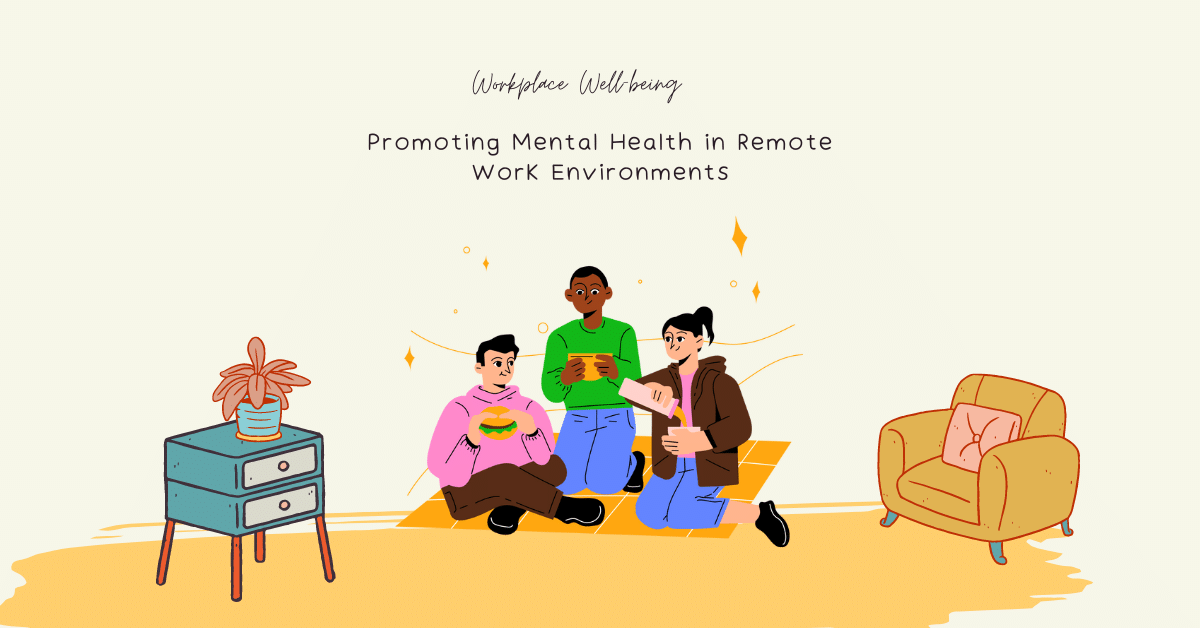Remote work has become a new norm for many businesses worldwide, offering flexibility but also presenting unique challenges to mental health. Maintaining mental health in remote work is essential for overall employee wellness, productivity, and long-term job satisfaction. Remote workers often face difficulties balancing their professional and personal lives, which can lead to burnout. This article explores ways to promote mental well-being in remote work environments, highlighting strategies for maintaining a healthy work-life balance, preventing burnout, and supporting virtual team building.
The Importance of Mental Health in Remote Work
When working from home, employees can feel disconnected from their colleagues, leading to feelings of isolation. This is one of the most significant challenges to mental health in remote work. The lack of face-to-face interaction with coworkers can impact emotional well-being, making it harder to stay motivated. Additionally, telecommuting can blur the boundaries between work and personal life, making it difficult to disconnect at the end of the day.
Employers should prioritize mental health and take steps to support their remote teams. A healthy workforce is a productive workforce, and when employees feel supported, they are more likely to remain engaged and focused on their tasks.
Encouraging Employee Wellness in Remote Work Environments
Employee wellness is a broad concept that includes physical, mental, and emotional well-being. For remote workers, it’s crucial to create a daily routine that supports overall wellness. Here are a few strategies for promoting wellness while working remotely:
- Create a dedicated workspace: Having a separate space to work can help create boundaries between work and personal life.
- Take regular breaks: Short breaks throughout the day can reduce stress and increase productivity. Encourage employees to step away from their screens for a few minutes to refresh their minds.
- Practice self-care: Self-care activities, such as exercise, meditation, or spending time with loved ones, are essential for maintaining emotional balance.
Employers can support their workers by offering wellness resources, such as mental health workshops or access to online counseling services like those provided at Passages WV.
Achieving Work-Life Balance in Remote Work
One of the biggest challenges of working from home is finding a healthy work-life balance. Since there is no clear separation between the office and home, it can be easy to work longer hours or feel the need to be constantly available. This can quickly lead to exhaustion and burnout.
To promote a healthy work-life balance, employers can encourage the following:
- Set clear working hours: Encourage employees to establish a fixed work schedule and stick to it. They should be mindful of not letting work spill over into their personal time.
- Turn off notifications: Employees should feel empowered to turn off work-related notifications after working hours to prevent burnout.
- Respect time off: Encourage employees to take breaks, use their vacation days, and disconnect when they’re not working.
Establishing boundaries between work and home life can lead to improved productivity and mental health in remote work settings.
Burnout Prevention in Remote Work
Burnout prevention is crucial in a remote work environment where employees may feel more pressure to prove their productivity. Burnout is a state of physical, emotional, and mental exhaustion caused by excessive and prolonged stress. It can negatively affect job performance, motivation, and overall mental health.
To prevent burnout, it’s important to focus on the following areas:
- Workload management: Encourage employees to break down larger tasks into smaller, manageable parts. This can make the workload feel less overwhelming.
- Regular check-ins: Employers should check in with their remote teams to ensure they aren’t feeling overwhelmed. Open communication is key to identifying signs of burnout early on.
- Encourage rest: Taking time off is essential to prevent burnout. Employees should be encouraged to take breaks throughout the day, including a full lunch break, and use their vacation time to recharge.
By promoting a culture that values rest and balance, companies can help their employees avoid burnout and stay motivated.
Virtual Team Building for Mental Health Support
Staying connected with colleagues is vital for maintaining good mental health, especially when working remotely. Virtual team building is an excellent way to help remote workers feel engaged and connected to their team. These activities can reduce feelings of isolation and create a sense of belonging, which is essential for mental well-being.
Some ideas for virtual team building include:
- Online games: Virtual games can bring the team together and create a fun, collaborative environment.
- Virtual coffee breaks: Setting up informal, virtual coffee breaks allows employees to socialize with each other and maintain personal connections.
- Team challenges: Team fitness challenges or other group activities can keep everyone connected and motivated to take care of their health.
By creating opportunities for virtual interaction, companies can help employees maintain strong relationships and feel more engaged with their work.
Productivity Tips for Remote Workers
Maintaining productivity while working from home can be challenging for some employees. Without the structure of a traditional office environment, distractions at home can easily impact focus. To help employees stay productive, here are some helpful productivity tips:
- Set daily goals: Setting specific goals for the day can help employees stay on track and avoid procrastination.
- Use time management tools: Tools like time-tracking apps or calendar reminders can help employees organize their day and ensure they stay on top of tasks.
- Stay organized: A clutter-free workspace and a well-organized to-do list can make it easier to stay focused.
By providing these productivity tips, employers can help their remote teams stay efficient while supporting their mental health.
Addressing Telecommuting Challenges
While remote work offers flexibility, it also comes with its own set of challenges. Telecommuting challenges include feelings of isolation, lack of work-life balance, and difficulty staying motivated. To address these issues, both employers and employees need to be proactive.
Employers can provide the following support:
- Offer resources for mental health: Providing access to mental health services, such as online counseling or workshops, can give employees the support they need.
- Encourage professional development: Offering opportunities for growth and learning can help employees feel valued and keep them engaged in their work.
- Foster open communication: Creating a culture of open communication can help employees feel comfortable reaching out when they face challenges.
By acknowledging these challenges and providing the necessary support, companies can create a positive work environment for their remote teams.
Why Passages WV?
At Passages WV, we understand the importance of mental health, especially in remote work environments. Our services are designed to support individuals and companies in promoting well-being and addressing the unique challenges of telecommuting. Whether you need counseling, mental health resources, or wellness workshops for your team, we’re here to help.
Conclusion
Mental health in remote work is a crucial factor in employee wellness and long-term productivity. By promoting work-life balance, preventing burnout, encouraging virtual team building, and offering support for telecommuting challenges, companies can create a healthy and thriving remote work environment. Employers should prioritize the mental well-being of their employees by providing resources, encouraging rest, and creating opportunities for connection. For additional support, visit Passages WV to learn more about how we can help improve mental health in your workplace.







